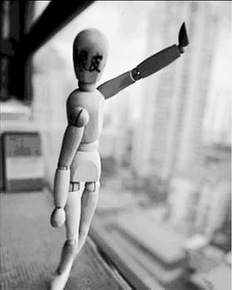梦破、梦醒或梦圆了,回到现实,所以无梦。伤痛太多、太重、太深了,已经麻木,反而无痛。生活过得艰难、单调、自我,日复一日,变得无趣。越来越多的中国人,正在变成无梦、无痛、无趣的“橡皮人”。
"One day at a time" might be the motto for a growing group of fatigued young, white-collar Chinese known as 'eraser' or 'plasticine' men (xiang pi ren).
“得过且过”大概是越来越多疲惫的年轻白领一族的生活信条,他们被称为“橡皮人”。

Brow-beaten out of shape by life, they show little if any response as they are kneaded this way and that, they are mostly white-collar workers who are somewhat numb to life, have no dreams, interests or ideals, and do not feel much pain - or joy.
在生活的压力下,他们的身体状况都不佳,遭到任何的待遇也不会有太多反应,他们多数是白领,对生活麻木,没有梦想、爱好或理想,也感觉不到痛苦或快乐。
These 'plasticine men' can be found among doctors, bank employees, teachers, journalists, traffic policemen, civil servants, actors and taxi drivers. Typically, they work alone and for more than 50 hours a week. They feel as if they have expended all their energy and all they get in return is a sense of emptiness.
在医生、银行职员、教师、记者、交通警、公务员、演员以及出租车司机当中,你都可以见到“橡皮人”的身影。他们通常独自工作,每周工作超过50个小时。他们觉得已经耗尽了全部的精力,而获得的回报却只是一种空虚感。
The term comes from a 1986 book, Xiang Pi Ren (Plasticine Man), by still-popular novelist Wang Shuo, that was later made into a film entitled Out Of Breath (Da chuan qi).
“橡皮人”这个称呼来源于著名小说家王朔1986年的作品《橡皮人》,该书后来被改编成电影《大喘气》。
相关阅读
(中国日报网英语点津 Helen 编辑)